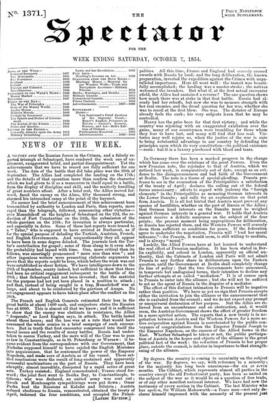NEWS OF THE WEEK.
A VICTORY over the Russian forces in the Crimea, and a falsely re- ported, triumph at Sebastopol, have rendered the week one of ex-
citement, exaggerated belief, and partial disappointment. Yet the achievements that we have to record are fully sufficient for one week. The date of the battle that did take place was the 20th of September. The Allies had completed the landing on the 17th ;
and the details of that operation more than confirm the character which we had given to it as a manoeuvre in itself equal to a battle, from the display of discipline and skill, and the masterly handling of great numbers afloat. After a brief rest, the Allies moved for- ward, faced the enemy on the Alma, fifty thousand strong, and stornied:his intrenched camp at the point of the bayonet.
No sooner had the brief announcement of this achievement been transmitted by authority to London and Paris, than reports, more
rapid than the telegraph, followed, announcing other victories—
over Mensohikoff on the heights of Sebastopol on the 22d, the re- duction of Fort Constantine on the 24th, the submission of the whole garrison on the 25th ; for invention is always particular, and especially in dates. Some of these last reports were traced to a " Tatar," who is supposed to have arrived at Bucharest, as if for the special purpose of deluding the Turkish, Austrian, French, and English Governments. And unquestionably they all appear to have been in some degree deluded. The journals took the Tar- tar's contribution for gospel ; some of them clung to it even after the probability had lapsed with time. One, more critical than its fellows, was sneeringly pronounced " more nice than wise " ; and other ingenious writers were presenting elaborate arguments to
prove that the reports might be true, which before the week was out were established as sheer fiction. We have intelligence down to the
28th of September, scanty indeed, but sufficient to show that there had been no critical engagement subsequent to the battle of the 20th ; that Sebastopol had not been invested ; that the materiel for the purpose had not yet been placed in a position to attack ; and that, instead of being caught in a trap, 34 ensehikoff was at large, and about to be reinforced by the garrison of Anapa. No set engagement appears to have taken place after the conflict on the 20th.
The French and English Generals estimated their loss in the great battle at about 1400 each, and conjecture states the Russian loss at 6000. This is almost all that we know; and it is sufficient to show that the enemy was obstinate in resistance, the Allies " desperate," as Lord Raglan says, in attack. The battle lasted about three hours ; and the loss was at a rate that would have consumed the whole armies in a brief campaign of such encoun- ters. But in truth that first encounter compressed into itself the moral issues and the results of many battles. Russia had under- taken to coerce Turkey, and the mere will of the Czar was to pass as law in Constantinople, as in St. Petersburg or Warsaw : it be- came evident from the correspondence with our Government, that Nicholas supposed himself to have cajoled the English Ministers
into acquiescence that he contemned the power of the Emperor Napoleon, and made sure of Austria as of his vassal. These set- tled conclusions were the result of long-sustained and apparently successful machinations on the part of Russia. They have been abruptly, almost incredibly, dissipated by a rapid series of great acts. Turkey resisted; England remonstrated ; France stood for- ward ; the joint fleet went to Besika Bay, to Constantinople, to Odessa; war was declared, an united army was sent out ;
Greek and Montenegrin sympatbizings were put down ; Omar Pasha beat the Russians at Kalafat and Silistria ; Austria refused obedience to Russia, remonstrated, obtained the treaty of April, indorsed the four conditions, and occupied the Princi- [LkrEsT EDInorr.] palities. All this time, France and England had scarcely crossed swords with Russia by land; and the long deliberation, the known preparation, invested the expedition against the Crimea with unpa- ralleled importance. Here all went well : the transit was beauti- fully accomplished; the landing was a master-stroke ; the natives welcomed the invaders. But what if, at the first actual encounter afield, the Allies had sustained a reverse ? The one question shows how much there was at stake in that first battle. Russia had al- ready had her rebuffs, but now she was to measure strength with her real enemies, and the dread question for her was, whether she was to recoil at the first blow. She was. The dictator of Europe already feels the curb ; his very subjects learn that he may be controlled.
Heavy has the price been for that first victory ; and while the country was rejoicing with an exaggerated exultation over the gains, many of our countrymen were trembling for those whom they fear to have lost, and many will find that loss real. Vic- tories may well rejoice us, when the justice of the war is mire to bring substantial advantage to our country by defending the principles upon which its very constitution—its political existence —rests : but it is a luxury purchased with blood and tears.


































